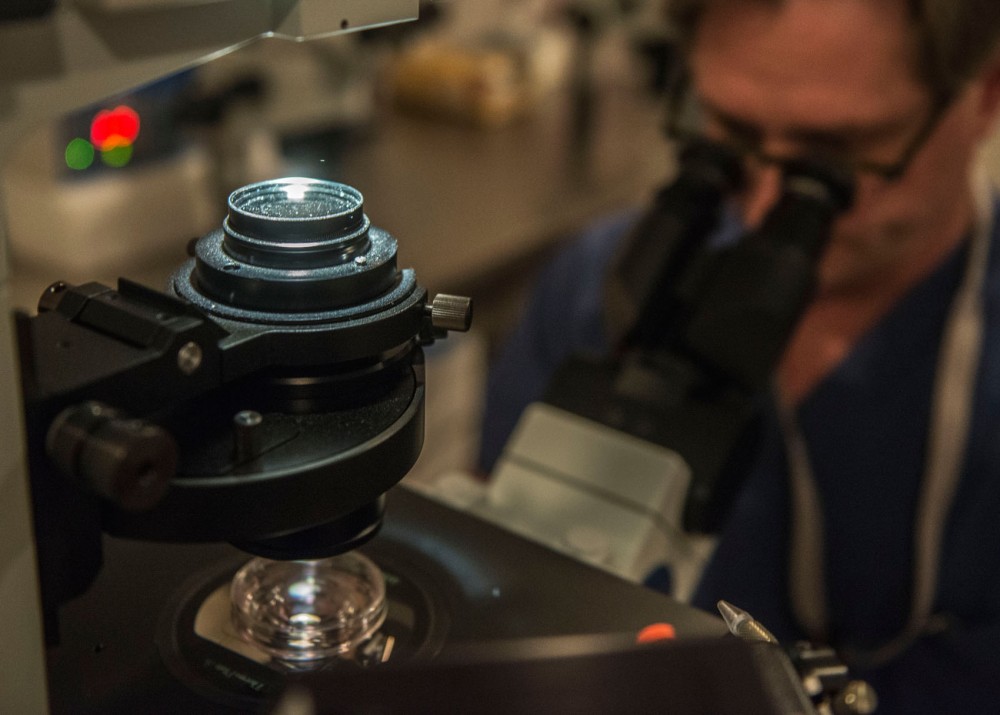After the American Society for Reproductive Medicine declared in 2012 that freezing eggs was no longer an experimental procedure, more women began considering it as a liberating option.
June Carbone, a University of Minnesota Law School professor who holds the Robina Chair in Law, Science and Technology, is encouraging women to weigh the implications that freezing their eggs could have on their relationships, careers and society.
Carbone said men who graduate from college typically spend their 20s getting into the right job, their 30s climbing the corporate ladder and their 40s reaping the benefits. Women college graduates, on the other hand, often have to choose between the most ambitious career track and having a child.
But egg freezing could change that, she said.
In 2013, more than half of the women who froze their eggs did so for social reasons like wanting to delay motherhood, according to a survey from the American Society of Reproductive Medicine.
“These forces, they’re going to make this option more attractive,” Carbone said. “And once people start doing it, it becomes like buying an insurance policy — you’re unwise if you don’t do it.”
Global studies junior Gracia Obeid said she hopes to work with Middle Eastern governments and companies to increase sustainability after she graduates from the University. She wants to have children someday, ideally at about age 30, but she admits that her drive for a job, which will allow travel and upward mobility, may limit her ability to do so.
But she wouldn’t want to freeze her eggs, she said — she’d rather find a partner who’s willing to work with her to sustain a career and a child at the same time.
The women who have the most incentive to freeze their eggs are those who are on aspiring career tracks, Carbone said. Women who are ready to have children in their 20s and who have jobs with little room for advancement may not be as motivated to pay for the procedure, she said.
If more women in higher-paying jobs freeze their eggs and have children later in life, Carbone said, one downside could be an increased socioeconomic gap between the two groups.
At the University of Minnesota Physicians clinic, it costs about $12,500 to have eggs frozen, which is usually not covered by insurance, said Gail Kelly, director of clinical operations for Reproductive Medicine.
Fertility begins to decrease in women at about age 35, said Christopher De Jonge, senior director of laboratory operations at the University Physicians’ Reproductive Medicine Center.
“That’s one of the cruel things about nature,” he said. “Women suffer the effects of aging, at least in a reproductive context, earlier than men.”
Many women getting pregnant after 40 today are using donor eggs to do so, Carbone said. If they’d had the chance, she said, many of these women may have been interested in using their own eggs.
Freezing allows women to preserve their eggs at a specific state in their life, De Jonge said. So if a woman freezes her eggs at 20 and implants them to have a baby at 35, the eggs will still be as healthy and fertile as they were when she was 20.
Because of strict ethical laws at the national level, there hasn’t been much research on women freezing their eggs in the United States, Carbone said, so most has been done in other countries.
Carbone admits that because of the risks of the process, she hasn’t recommended it for her own daughters — but she has made sure they’re aware of the option.
Alternatively, men can freeze their sperm — a less intrusive and less expensive option.
But babies conceived from frozen sperm have been shown to have more birth defects, Carbone said, whereas those conceived from frozen eggs haven’t.
Gender inequality in the workplace has improved over the years, Carbone said, but there’s a ways to go, including in reproductive health.
Obeid, the global studies junior, said she worries that if freezing eggs becomes widespread, people will have less sympathy for women who don’t make that choice and struggle with moving up in the workplace.
She said she’s “disgusted” by the level of gender equality that still exists in the U.S., and freezing eggs shouldn’t have to be the best option for advancement.
“We shouldn’t have to modify the way our bodies work in order to have that equality,” she said. “I think we need to modify the way our brains work, the way we think about things, in order to achieve that.”
The process of freezing eggs
Freezing eggs is invasive and can have risks.
If a woman decides to freeze her eggs, she needs to have several tests done to evaluate her ovarian function and to screen for infectious diseases, said Christopher De Jonge, senior director of laboratory operations at the University of Minnesota Physicians’ ReproductiveMedicine Center.
Next, the woman takes a medication that stops the regular flow of hormones to her ovaries, he said, which may make her feel like she’s going through menopause. The physician can then inject outside hormones for 10 to 12 days, making the ovaries produce more eggs than they normally would. These hormones can cause mood swings or nausea, De Jonge said.
After that, a final hormone is administered to mature the eggs. After 36 hours, the eggs are extracted using a long needle that snakes its way up to the ovaries. In serious cases, he said, extraction can lead to side effects like heavy bleeding or swollen, painful ovaries.
“So it’s not a walk in the park, necessarily,” De Jonge said.
The eggs are not matured past 14 days until a woman wants to reproduce. After that time, cells begin to differentiate and become unique to a single person, according to the American Academy of Pediatrics.


